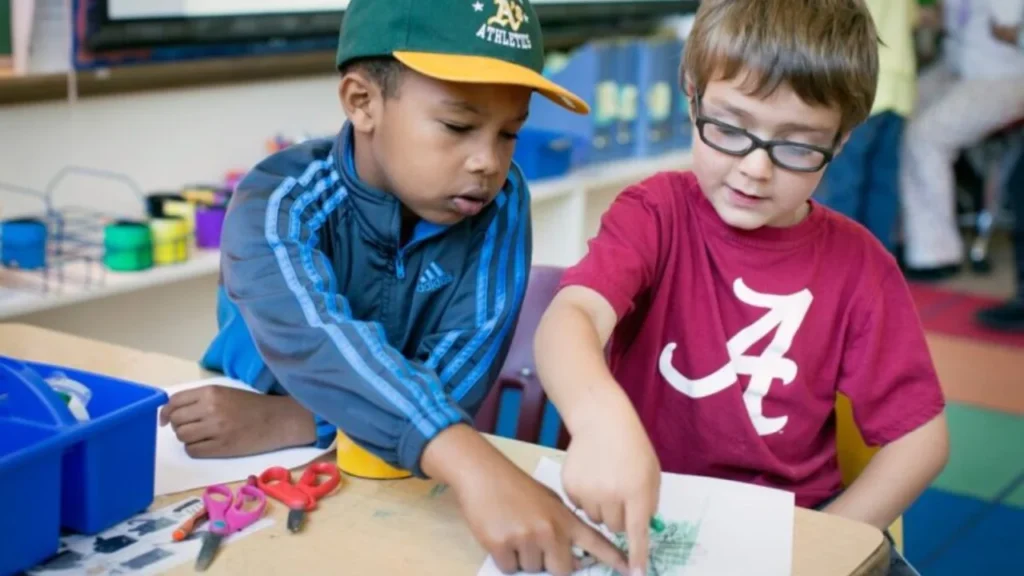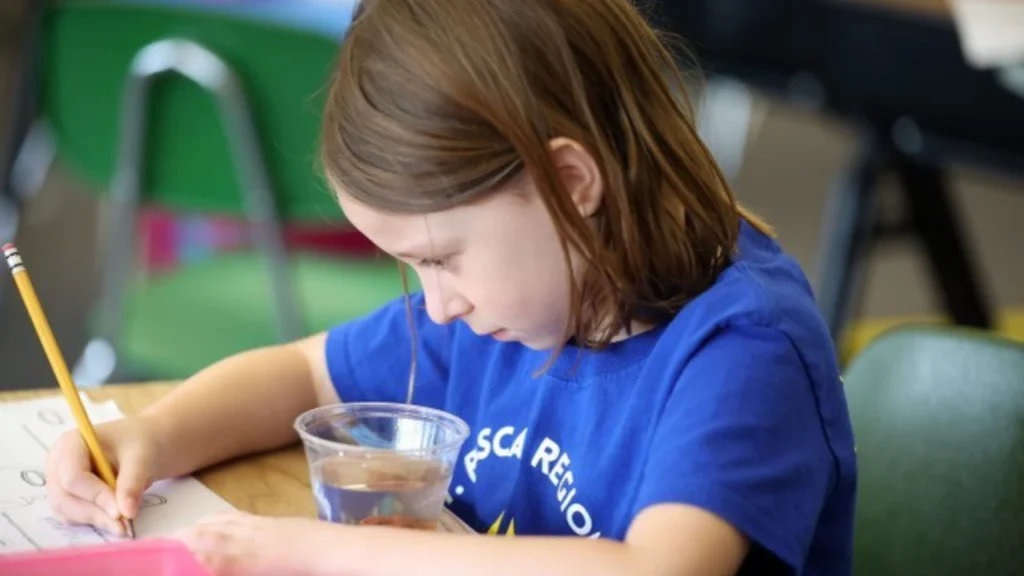![How Murfreesboro Day School Builds Confidence Through Supportive Early Childhood Education. Introduction The earliest years of a child’s life represent a powerful window of opportunity for brain development, learning, and emotional growth. Research shows that from birth to age five, children […]](https://dayschools.org/murfreesboro/wp-content/uploads/sites/3/2025/03/New-Project-3.webp)
Table of Contents
Introduction
The earliest years of a child’s life represent a powerful window of opportunity for brain development, learning, and emotional growth. Research shows that from birth to age five, children form more neural connections than at any other time in life, making this period crucial for laying the foundation of cognitive and social-emotional skills. At Murfreesboro Day School, early childhood education is not viewed merely as preparation for kindergarten—it’s regarded as a transformative experience that builds the essential traits children need to thrive throughout their educational journey and beyond.
Rather than limiting learning to rote memorization or rigid academic milestones, the school’s philosophy embraces the natural curiosity and creativity of young learners. Through developmentally appropriate practices, Murfreesboro Day School integrates play, exploration, and structured learning to develop the whole child. Lessons are tailored to encourage inquiry, critical thinking, emotional expression, and social interaction, ensuring that learning is meaningful and internalized, not just practiced. This holistic framework empowers children to become self-aware, socially connected, and intellectually engaged from an early age.
Ultimately, early education at Murfreesboro Day School serves as the launchpad for lifelong learning. Students graduate from preschool not only knowing letters, numbers, and shapes but understanding how to work with others, express themselves clearly, manage emotions, and approach challenges with confidence. The impact of this comprehensive early start is far-reaching—it doesn’t just prepare children for kindergarten, but equips them with a resilient mindset, emotional maturity, and love of learning that benefits them in every future stage of life. The school’s mission reflects this enduring commitment to developing both the heart and the mind, ensuring children flourish in a world that demands both intelligence and empathy.
Defining Confidence and Kindergarten Readiness
Confidence in young learners is not something that can be taught in a single lesson; it is built over time through meaningful experiences, encouragement, and support. At Murfreesboro Day School, confidence is cultivated intentionally, with each classroom interaction reinforcing the belief that children are capable, valued, and heard. Whether it’s mastering a new task, engaging in group play, or solving a problem independently, students are constantly given opportunities to build trust in themselves and their abilities. This intrinsic self-assurance becomes a vital tool as children approach the new and often intimidating transition to kindergarten.
Kindergarten readiness is a multifaceted concept that extends well beyond academic skills. It includes language development, the ability to follow directions, emotional regulation, fine and gross motor coordination, and social competence. Murfreesboro Day School’s curriculum addresses all these domains concurrently through a carefully balanced program of academics and play-based learning. Teachers observe each child’s progress closely, identifying strengths and areas for growth, and tailoring support to meet diverse developmental needs. This individualized approach ensures that every child feels both challenged and capable, which is essential for fostering true readiness.
By focusing on these intertwined elements of development, the school ensures that children do more than just meet kindergarten benchmarks—they surpass them with confidence and enthusiasm. Students who leave Murfreesboro Day School possess a readiness that is deeply rooted in emotional security and cognitive competence. They can communicate effectively, share and collaborate with peers, express their emotions constructively, and approach unfamiliar environments with resilience and positivity. This type of preparedness ensures that children aren’t just academically equipped for the next step—they’re mentally, emotionally, and socially poised for a smooth and successful transition into formal education.
The Importance of a Safe and Nurturing Environment
At Murfreesboro Day School, the belief that safety and emotional well-being are prerequisites for effective learning is woven into every aspect of the school’s culture. A child who feels secure—both physically and emotionally—is far more likely to engage, explore, and learn. To foster this kind of environment, the school implements rigorous safety protocols including secure entry points, childproofed classrooms, background-checked staff, and regular emergency drills. However, the commitment to safety extends beyond physical measures—it includes the emotional and psychological comfort of every child in the building.
Each classroom is a micro-community where children are taught that their feelings matter, their voices are heard, and they are cared for unconditionally. Teachers use positive reinforcement, emotional coaching, and gentle guidance to create spaces where students feel free to express themselves without fear of judgment. Social-emotional learning is built into the daily curriculum, with children participating in activities that foster empathy, cooperation, and emotional awareness. This nurturing environment is not only essential for healthy development but also acts as a springboard for academic and social success.
When children feel safe and supported, they become more willing to take risks, ask questions, and engage deeply with the learning process. A nurturing classroom encourages children to step outside their comfort zones and build resilience—key ingredients for confidence. Murfreesboro Day School understands that meaningful learning happens when students feel connected to their teachers, peers, and environment. By prioritizing emotional safety and consistent support, the school lays the groundwork for children to thrive not just academically, but as self-assured, compassionate individuals who are ready to navigate the complex social world of kindergarten and beyond.

Encouraging Exploration Within Boundaries
Confidence in young children grows when they are free to explore their environment—but that freedom must exist within a framework of thoughtful structure. At Murfreesboro Day School, we create an environment where children are empowered to make their own choices within clearly defined, developmentally appropriate boundaries. This intentional balance helps children feel safe, supported, and confident. Our curriculum is designed to promote open-ended discovery while offering the predictability and guidance young learners need. In this way, children experience both the freedom to learn and the security to take healthy risks.
When given opportunities to try new activities, solve problems, and follow their own interests, children begin to develop critical thinking and decision-making skills. They learn to trust their instincts, evaluate options, and reflect on the consequences of their choices. These early experiences are essential in shaping their confidence and autonomy. At Murfreesboro Day School, exploration is not about aimless wandering—it’s purposeful, guided learning that allows children to discover what they’re capable of. Teachers act as caring guides who encourage curiosity and creativity while providing the support needed to navigate new challenges.
This approach also fosters a strong sense of responsibility and self-regulation. As children begin to understand the impact of their actions, they take pride in managing their own behavior and contributing positively to their classroom community. Through consistent routines, gentle redirection, and positive reinforcement, at Murfreesboro Day we help children internalize boundaries without shame or fear. They become not just participants in their learning but active contributors to it. In this kind of environment, confidence doesn’t just emerge—it grows steadily and meaningfully, empowering children to approach future experiences with courage, self-assurance, and a lifelong love of learning.
Supportive Teachers Who Build Trust
The relationship between a child and their teacher is one of the most influential factors in early confidence development. At Murfreesboro Day School, our teachers aren’t just educators—they are trusted mentors who serve as consistent, nurturing figures in each child’s daily experience. Through kindness, attentiveness, and encouragement, they help children feel secure, valued, and capable. This emotional bond lays the foundation for a child to feel confident in expressing themselves and exploring new challenges.
Our teachers are trained to engage with children in ways that build both academic understanding and emotional intelligence. They listen actively, respond empathetically, and validate each child’s thoughts and feelings. This consistent support helps children internalize the belief that their voice matters. As children develop trust in their teachers, they also begin to trust in their own ability to make good choices and solve problems. That trust turns into confidence, especially when teachers celebrate both effort and progress.
We also recognize the importance of modeling confident behavior. Teachers at Murfreesboro Day School demonstrate resilience, patience, and positivity, showing children how to navigate setbacks and persevere. When a child sees an adult approach challenges with calm assurance, they are more likely to emulate that attitude. These daily interactions help cultivate a classroom culture of mutual respect, emotional safety, and trust—where children feel empowered to take initiative and grow into their fullest potential.
Building Confidence Through Challenges
Confidence doesn’t come from doing what’s easy—it’s built through the process of overcoming challenges that once felt just out of reach. At Murfreesboro Day School, we understand that growth happens when children are given opportunities to stretch beyond their comfort zones in a supportive, encouraging environment. That’s why we design meaningful activities and hands-on experiences that challenge each child just enough to spark development, without causing frustration or discouragement. Whether it’s solving a puzzle, completing a group project, or experimenting with new materials, these age-appropriate challenges help children experience the deep satisfaction that comes from genuine achievement.
Through carefully structured learning experiences tailored to each developmental stage, children are introduced to incremental challenges that promote resilience, persistence, and creative problem-solving. Mistakes are embraced as part of the process—not setbacks, but stepping stones to success. This mindset shift is powerful: children begin to see effort as a path to progress, and they learn to trust their ability to figure things out, even when the solution isn’t immediately clear. Instead of shying away from difficulty, they gain the confidence to engage with it, understanding that perseverance leads to success.
Teachers play a vital role in this process. At Murfreesboro Day School, our educators are intentional in how they guide students through new experiences. They observe closely, offering just the right amount of support while giving children the independence to try, make adjustments, and try again. Every small victory—whether it’s tying a shoe, completing a challenging task, or navigating a social situation—adds to a child’s growing sense of self-belief. These moments, though often subtle, accumulate over time to form a strong foundation of inner confidence. As children continue to meet and overcome challenges, they develop the courage and competence they’ll carry with them into every new stage of learning and life.

Age-Appropriate Challenges That Inspire Progress
Confidence doesn’t come from doing what’s easy—it’s born from overcoming challenges that once seemed just out of reach. At Murfreesboro Day School, we intentionally design activities and experiences that stretch each child just enough to encourage meaningful growth, without leading to frustration or discouragement. These age-appropriate challenges—whether in the form of puzzles, group projects, or hands-on exploration—are key to helping children experience the deep satisfaction that comes from personal achievement.
By introducing incremental challenges suited to each developmental stage, Murfreesboro Day School fosters a mindset of persistence, resilience, and creative problem-solving. Children learn early on that making mistakes is not failure—it’s an important and expected part of learning. With encouragement and support, they discover that effort leads to progress and that they are capable of more than they initially believed. This process transforms hesitation into self-assurance, giving children the confidence to try, stumble, and try again.
Our teachers at Murfreesboro Day School play a vital role in guiding students through each challenge with a thoughtful balance of support and independence. They observe attentively, offering help when needed while also stepping back to empower children to take the lead. Each time a student revisits a task, solves a problem independently, or achieves something new, they are building inner confidence. These everyday victories—both big and small—accumulate to form a solid foundation of self-belief that prepares children to tackle future academic, emotional, and social milestones with courage and confidence.
The Cornerstone of Growth
Children thrive when they feel secure, both physically and emotionally. At Murfreesboro Day School, we understand that a safe environment is the essential first step toward confident learning. We go beyond meeting basic health and safety standards by cultivating classrooms where children feel emotionally protected and respected. A strong sense of safety allows children to be vulnerable, take risks, and express their true selves without fear of judgment or failure.
Our commitment to safety begins with the physical environment—secure entrances, clean facilities, and vigilant supervision—but it doesn’t stop there. Emotional safety is just as critical. Our staff is trained to identify and support the emotional needs of young learners. They create predictable routines, respond to children with warmth and patience, and foster an atmosphere of mutual respect. These practices help children feel stable, valued, and ready to engage in meaningful learning experiences.
When children feel safe, they are more willing to step out of their comfort zones. They’ll try new activities, interact with unfamiliar peers, and take on challenges that stretch their abilities. This openness to growth is the foundation for developing resilience and confidence. At Murfreesboro Day School, we don’t just keep children safe—we empower them to feel brave, supported, and ready to shine.
Building Resilience Through Incremental Challenges
At Murfreesboro Day School, confidence isn’t built through ease—it’s nurtured through thoughtful, manageable challenges that encourage children to stretch beyond their current capabilities. The school embraces a growth mindset philosophy, where effort and perseverance are celebrated as much as outcomes. Educators design developmentally appropriate activities that challenge children just enough to spark learning and persistence, without overwhelming them. This careful balance helps young learners experience the satisfaction of effort, the process of trial and error, and the rewarding feeling of accomplishment—all of which build resilience.
Children are encouraged to take on new responsibilities, solve problems independently, and navigate minor setbacks in a supportive environment. Whether it’s completing a puzzle, sharing materials during group activities, or learning to zip a jacket, each small challenge offers a lesson in patience, determination, and self-control. Teachers provide gentle guidance, but they also step back to allow children the space to try, fail, and try again. This autonomy builds self-efficacy—the internal belief that they are capable of influencing their own success.
The school also uses mistakes as teachable moments rather than failures. When a child struggles with a task or makes an error, educators model constructive responses, guiding students to reflect on what went wrong and what they might try differently next time. This practice helps normalize mistakes as part of learning, reducing fear of failure and fostering a mindset of resilience. Over time, children at Murfreesboro Day School learn to approach new academic concepts, social situations, and personal challenges with confidence and adaptability.

Preparing Confident, Capable Kindergarten-Ready Learners
By the time children leave Murfreesboro Day School, they are not only equipped with foundational academic skills—they are emotionally prepared to thrive in kindergarten and beyond. The journey toward school readiness is about more than letter recognition and number sense; it’s about cultivating self-assurance, independence, and the ability to navigate the world with curiosity and resilience. Children who leave with a strong sense of who they are—and belief in what they can do—are positioned for long-term success.
Our educators take great care to ensure that each child develops a well-rounded skill set that includes both intellectual and emotional intelligence. Through collaborative projects, problem-solving tasks, and guided social experiences, children practice essential skills such as cooperation, critical thinking, and self-regulation. They’re encouraged to ask questions, express opinions, and take the lead in their own learning. These are the hallmarks of confident learners—children who are ready to step into new environments with enthusiasm.
Most importantly, the children at Murfreesboro Day School leave knowing they are capable and competent. They’ve had countless opportunities to overcome challenges, celebrate achievements, and feel supported every step of the way. That foundation of trust—trust in their teachers, trust in their environment, and ultimately, trust in themselves—is what prepares them for a confident start in kindergarten. We don’t just prepare children for the next grade level—we prepare them for life.
Conclusion
Confidence is not something that suddenly appears—it is carefully and consistently nurtured through everyday moments of connection, exploration, and accomplishment. At Murfreesboro Day School, we understand that the early years are a critical window of opportunity to help children build an unshakable belief in themselves. Every choice we make—from classroom design to teacher training—is rooted in our commitment to helping children grow into brave, capable learners.
Whether it’s the comfort of a predictable routine, the encouragement of a caring teacher, or the celebration of a new skill mastered, children are surrounded by intentional opportunities to grow in confidence. These moments may seem small in isolation, but over time, they compound to create a powerful sense of self-worth. When children know they are safe, supported, and capable, they are more likely to take healthy risks, bounce back from mistakes, and embrace new challenges with a positive mindset.
At Murfreesboro Day School, every day is a step forward. And every step—no matter how small—is taken with care, intention, and the belief that each child has limitless potential. We are proud to be a place where confidence takes root and grows, one safe step at a time.






